The ultimate stick man
Curler popularized a form of sport that allowed people of all ages, abilities to play
Advertisement
Read this article for free:
or
Already have an account? Log in here »
To continue reading, please subscribe:
Monthly Digital Subscription
$0 for the first 4 weeks*
- Enjoy unlimited reading on winnipegfreepress.com
- Read the E-Edition, our digital replica newspaper
- Access News Break, our award-winning app
- Play interactive puzzles
*No charge for 4 weeks then price increases to the regular rate of $19.00 plus GST every four weeks. Offer available to new and qualified returning subscribers only. Cancel any time.
Monthly Digital Subscription
$4.75/week*
- Enjoy unlimited reading on winnipegfreepress.com
- Read the E-Edition, our digital replica newspaper
- Access News Break, our award-winning app
- Play interactive puzzles
*Billed as $19 plus GST every four weeks. Cancel any time.
To continue reading, please subscribe:
Add Free Press access to your Brandon Sun subscription for only an additional
$1 for the first 4 weeks*
*Your next subscription payment will increase by $1.00 and you will be charged $16.99 plus GST for four weeks. After four weeks, your payment will increase to $23.99 plus GST every four weeks.
Read unlimited articles for free today:
or
Already have an account? Log in here »
Stick curling was essentially new and unheard of when Ernie Oliver started driving up and down Manitoba — and later across Canada — to introduce the sport to curlers about 25 years ago.
It is now played by thousands of people in clubs across Canada thanks to the efforts of people such as Oliver, a Manitoba Curling Hall of Fame inductee for his role as a builder. In stick curling, two-person teams deliver a rock from a standing position or from a wheelchair using a stick, hence the name.
“His thing was always that when people get older, they can’t get into the hack anymore,” his daughter Roberta Oliver said. “He did it so the older people who loved curling could still curl. Every year, he kept teaching more people and going out there, getting the sport as big as he could.”
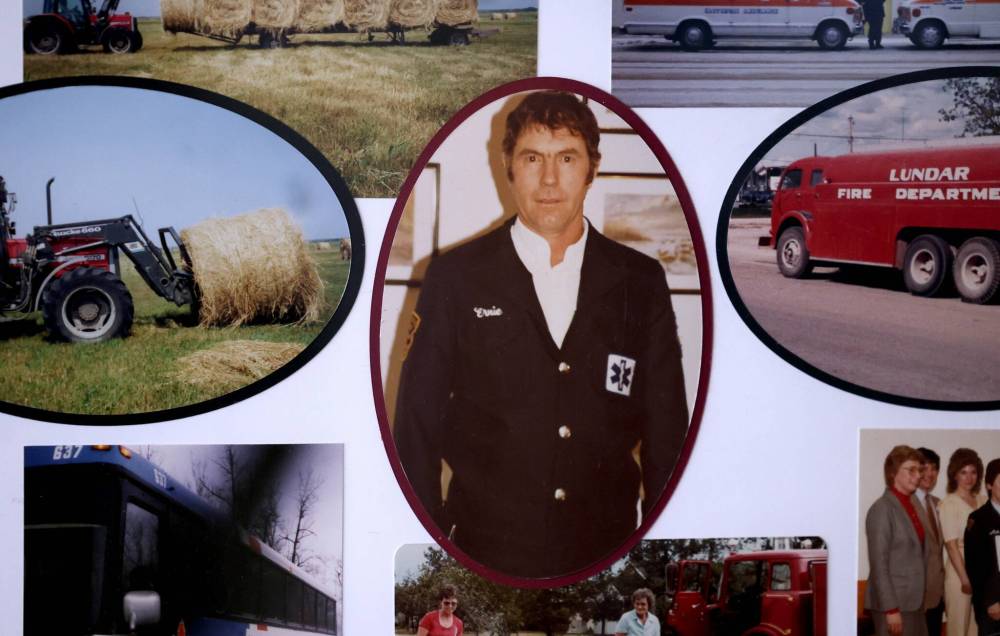
Supplied
Ernie Oliver
Oliver received several accolades for helping to extend curling careers and keep seniors active.
He was 89 when he died in Winnipeg on Feb. 9. His ashes were placed in a custom wooden urn shaped like a curling rock.
Born in Winnipeg on June 11, 1935, Albert Ernest (Ernie) Oliver grew up on a farm in Marquette, about 35 kilometres northwest of the city.
It was there that he discovered his lifelong love for curling and other activities, including hockey and baseball, while working on the farm from a young age.
When Oliver was in his teens, local residents came together to build and operate a two-sheet curling rink in Marquette. Their efforts left a lasting impression on him, his daughter Darlene Witt said.
“I think for him, as a young man, it was a starting point. It was a community thing. He was always involved with something in the community,” she said.
Marquette has a population of about 50 people today, according to the RM of Woodlands. The community’s rink, which has a stick curling league, is still going more than 70 years later.
A man of many hats in his adult life, Oliver purchased his own farm — raising cattle and hogs, and producing grain — and started a family. He and his first wife had five daughters and one son.
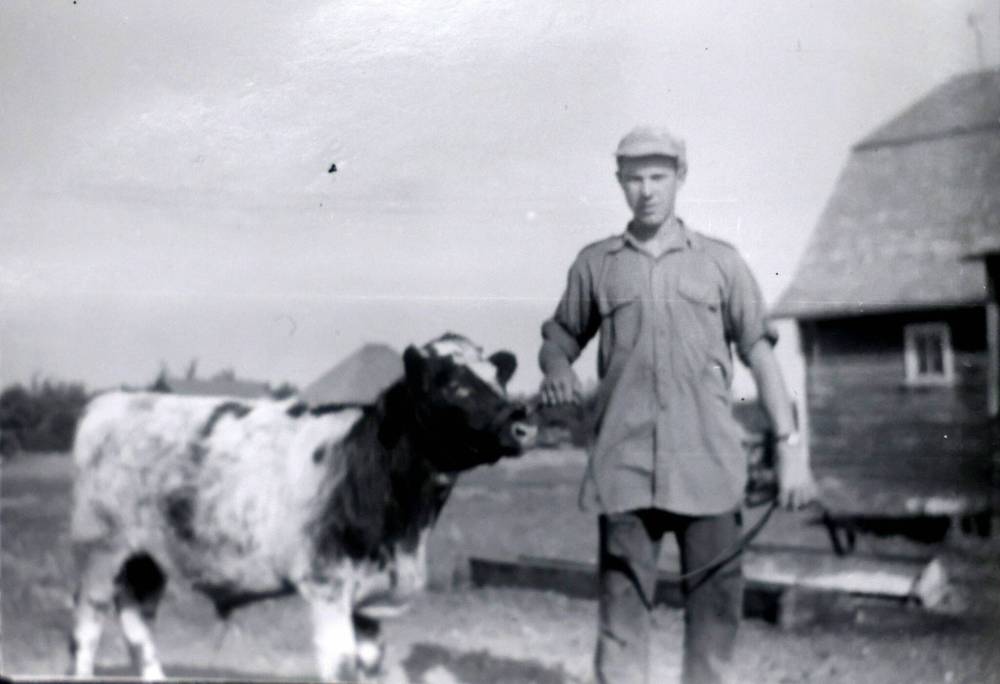
Supplied
Ernie Oliver grew up on a farm in Marquette.
He moved to Lundar, where he owned and operated Oliver’s Grocery for 12 years from 1976, and spent time as the community’s volunteer fire chief and an ambulance driver.
“He did pretty much anything and everything he could, and he always loved what he did,” Witt said.
After retiring from the store, Oliver moved to Winnipeg, where he became a commercial bus and semi-truck driver.
“He just loved it. He would have done it for no pay. He just loved driving and seeing the country,” Roberta Oliver said of her father’s time as a trucker.
Oliver also played the role of Santa at Eaton’s flagship store in downtown Winnipeg for a few years. In his spare time, he enjoyed travelling, hunting and fishing trips in the Grand Rapids area with family members.
He loved to catch up with family and friends over a cup of coffee, whether it was in a kitchen or coffee shop or by a curling rink.
There was a time when Oliver curled more than 250 games a season in clubs, leagues and bonspiels. He played in multiple masters provincials, making it to the final with different skips in 1998 and 1999.
Roberta Oliver and Witt said their father probably loved curling so much because of the social aspect.
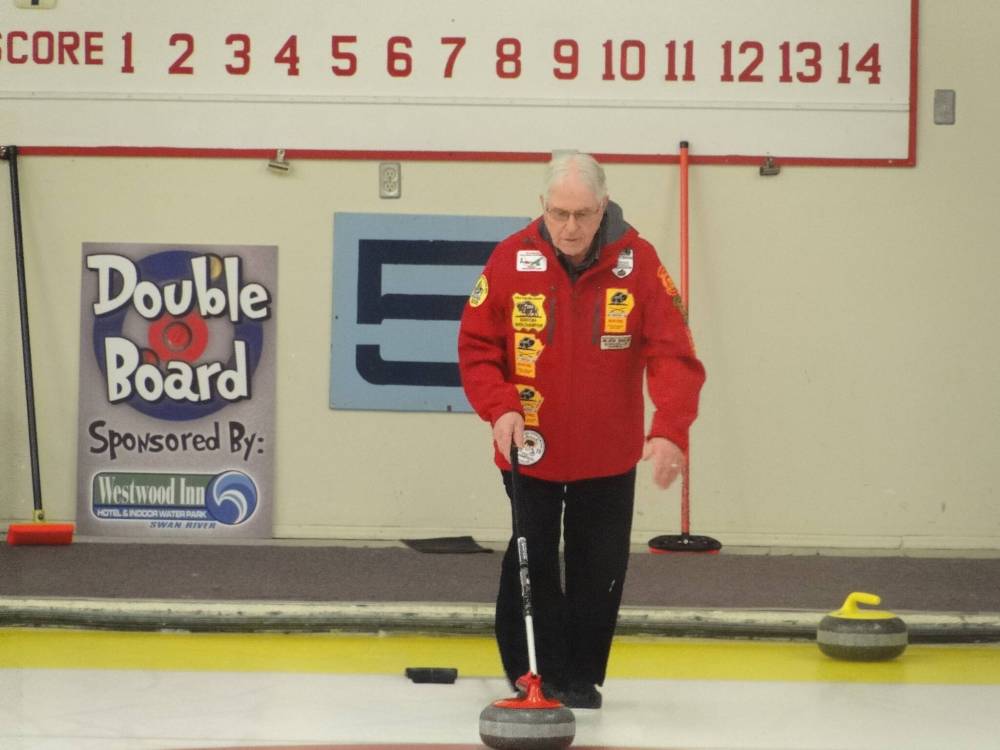
Supplied
Ernie Oliver, who was inducted into the Manitoba Curling Hall of Fame as a Builder, died in February at the age of 89.
“He was a social butterfly. He couldn’t sit still. He was always out, whether it be at a curling rink or out for coffee. He was probably born running,” Roberta Oliver said.
Curling rinks play an important role in rural communities such as Marquette, Witt noted, because they are a hub for social activity.
Oliver turned to stick curling when he started to have difficulty sliding out of the hack.
“With knees and hips when you get older, you can’t do that any more. People he curled with all his life could no longer curl because of limitations or health concerns. They still wanted to curl and they wanted to be active in the community, so stick curling became the thing,” Witt said.
Oliver helped grow the game into what it is today as one of its earliest promoters. He held instructional clinics across Manitoba, while self-funding his early travels, and branched out to clubs across Canada.
He was a founder and first president of the Manitoba Stick Curling Association. He was one of a few people who had the vision and led a national movement to establish a Canadian Stick Curling Association, said friend and fellow curler Resby Coutts.
“He helped to invent a new version of the sport. Ernie’s contribution to the health of so many curling clubs is huge,” said Coutts, past-president of the Manitoba Stick Curling Association.
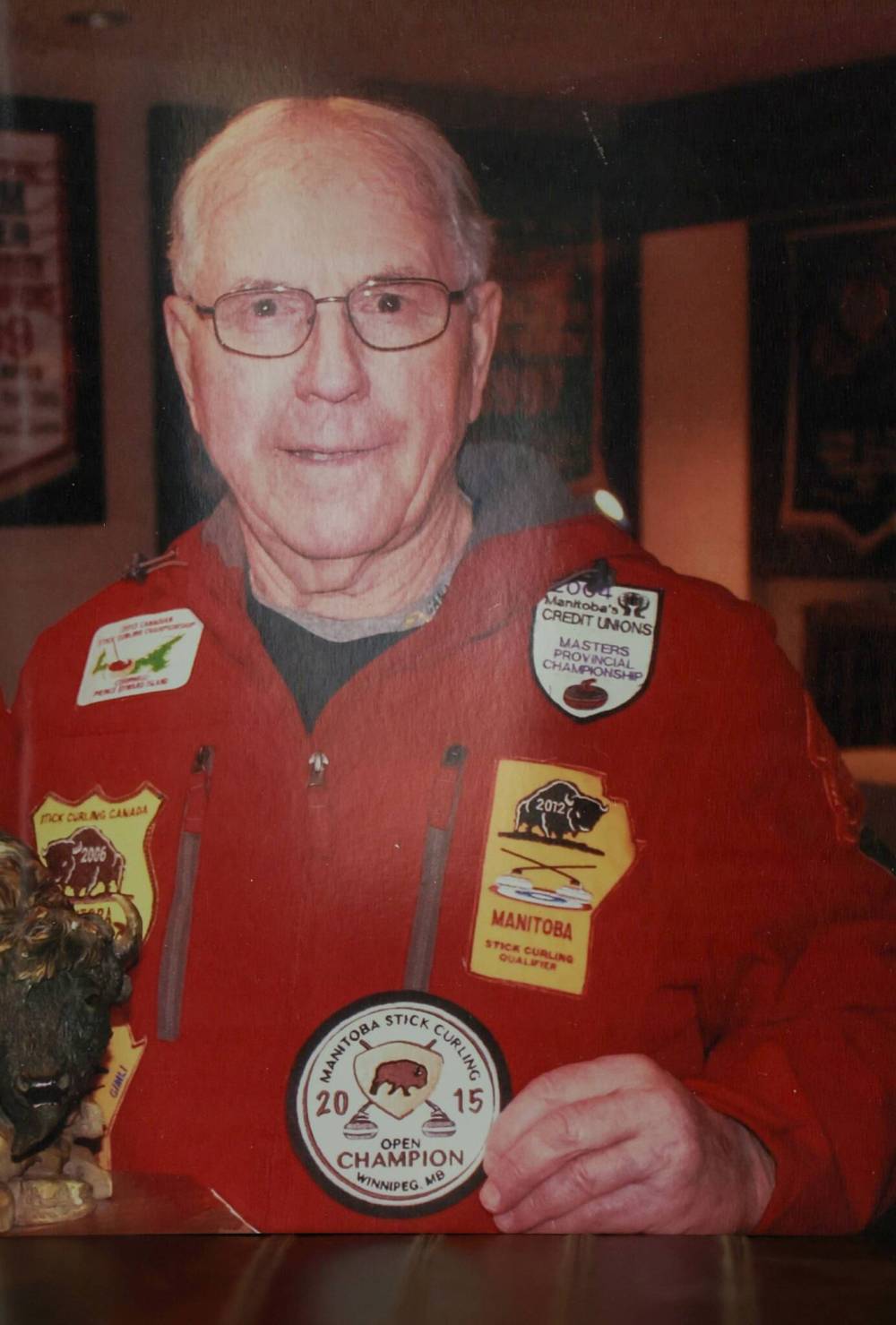
Supplied
Ernie Oliver was inducted into Manitoba’s curling hall of fame (the 2000 class, but the actual induction was delayed due to COVID).
He won five Manitoba titles during his stick curling career, with Coutts describing Oliver as a fierce competitor on the ice.
Oliver is credited with helping to extend curling careers or get countless seniors back on the ice. This brought physical and mental-health benefits to many; helped establish men’s, women’s and mixed leagues and bonspiels as well as provincial and national championships; and fortified curling clubs with league and bonspiel fees and food and drink purchases by thousands who wouldn’t otherwise be playing.
“All of that grew out of Ernie’s promotional efforts, at least in Manitoba,” Coutts said.
His legacy includes the Ernie Oliver Stick ’Spiel.
At the 2014 national open championship in St. Albert, Alta., Oliver told a reporter the sport is for people of all ages, while he celebrated the growth of stick curling and the benefits for older people or those with physical disabilities.
“It gets them out for one hour of fresh air and exercise, and that is the best medicine you can give anybody,” he told the St. Albert Gazette. “It’s all about sportsmanship as well as socializing, and this is by far the most socializing sport that people can be in.”
In 2012, Oliver received a Manitoba Council on Aging Recognition Award, which lauded him for helping to establish curling leagues for seniors with injuries and mobility issues.
He was inducted into the Manitoba Curling Hall of Fame as a builder in 2020.
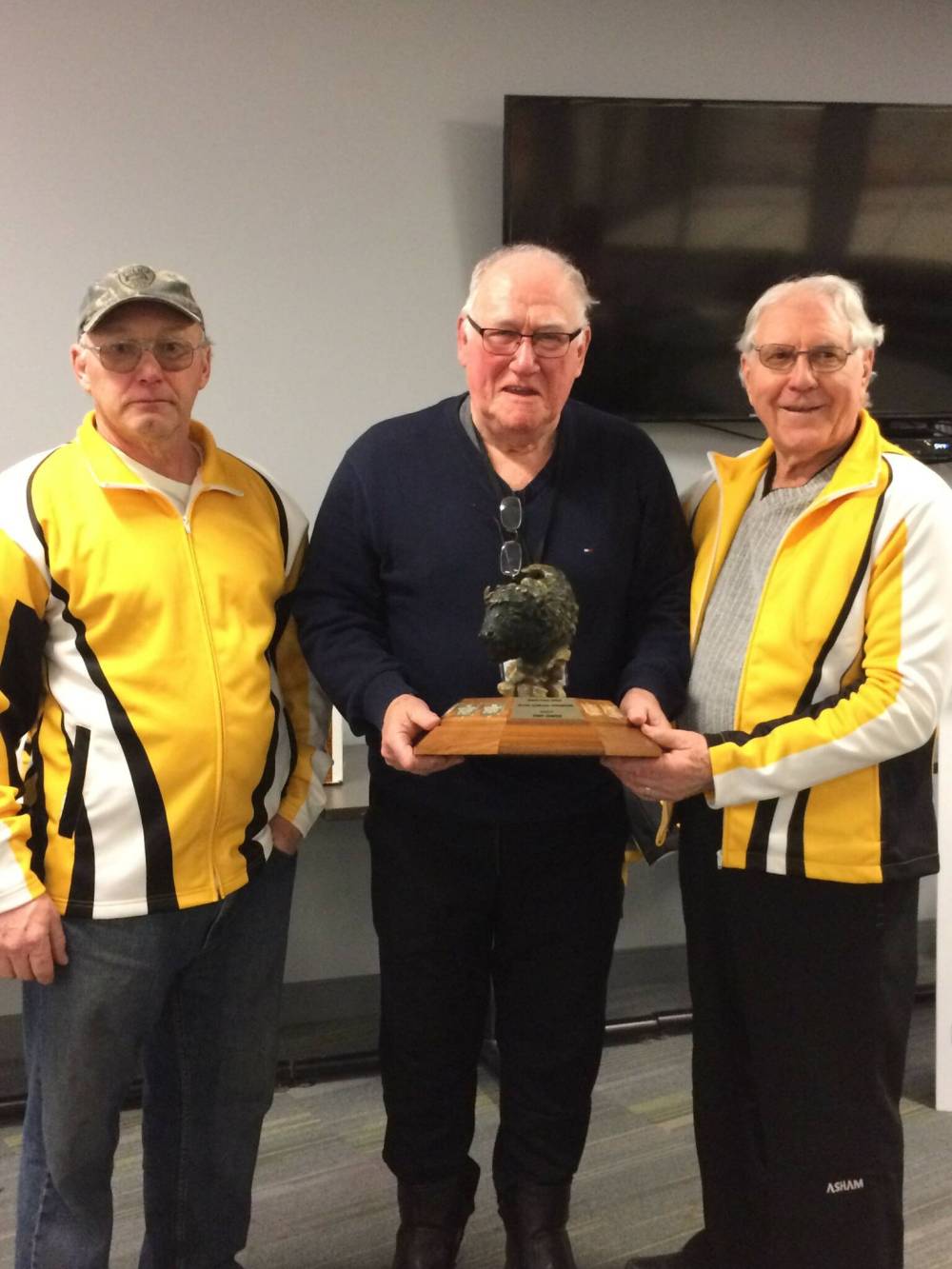
Supplied
Ernie Oliver (right) won the 2019 Manitoba 2-person stick curling championship with Ross MacMillan. Ernie’s longtime friend Harold Cook presented the championship trophy.
“That would have been one of his proudest moments — to be recognized for something that he spent so much time building,” Roberta Oliver said.
“That would have been everything for him,” Witt added.
Oliver is survived by his wife, Clara, his children Roberta Oliver, Connie Wilson, Darlene Witt, Joy Oliver and Derwin Oliver, plus 15 grandchildren and 16 great-grandchildren. He was predeceased by his daughter Pam Oliver-Bingham.
chris.kitching@freepress.mb.ca

Chris Kitching is a general assignment reporter at the Free Press. He began his newspaper career in 2001, with stops in Winnipeg, Toronto and London, England, along the way. After returning to Winnipeg, he joined the Free Press in 2021, and now covers a little bit of everything for the newspaper. Read more about Chris.
Every piece of reporting Chris produces is reviewed by an editing team before it is posted online or published in print — part of the Free Press‘s tradition, since 1872, of producing reliable independent journalism. Read more about Free Press’s history and mandate, and learn how our newsroom operates.
Our newsroom depends on a growing audience of readers to power our journalism. If you are not a paid reader, please consider becoming a subscriber.
Our newsroom depends on its audience of readers to power our journalism. Thank you for your support.

